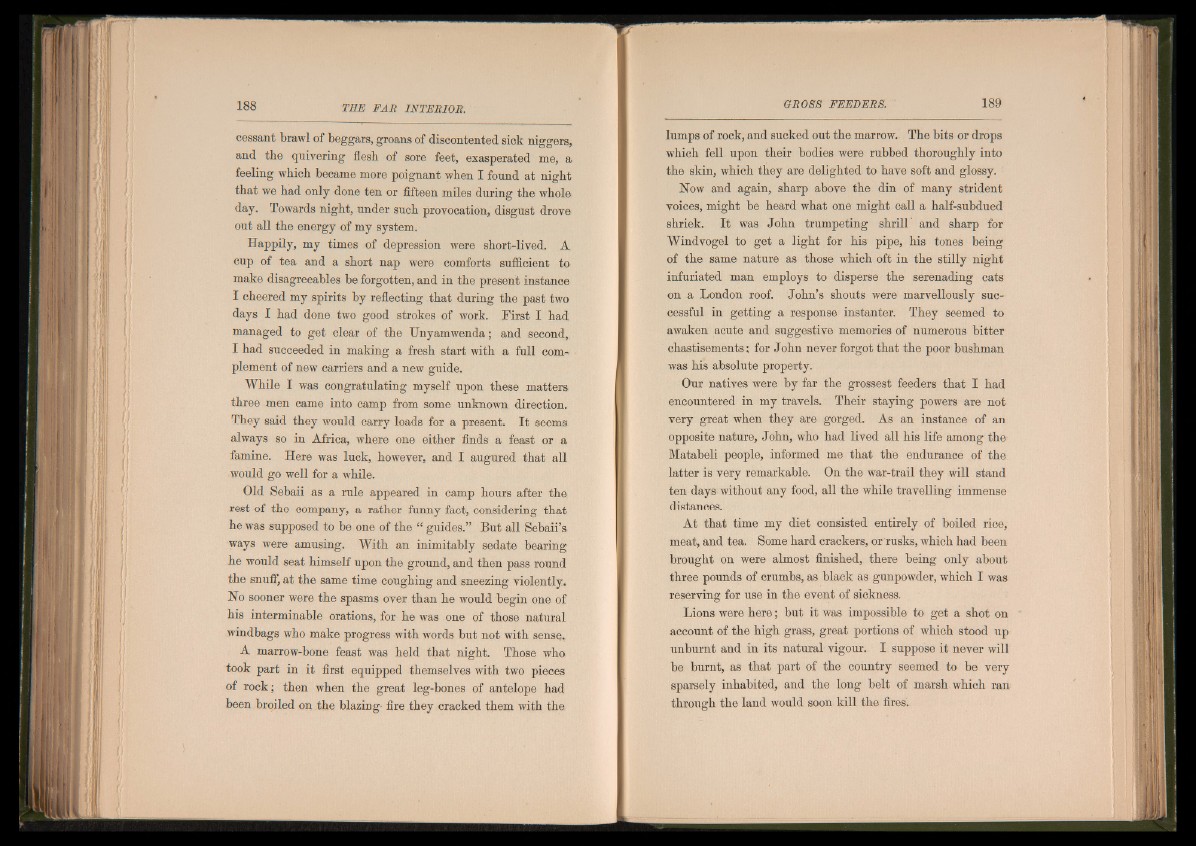
cessant brawl of beggars, groans of discontented sick niggers,
and the quivering flesh of sore feet, exasperated me, a
feeling which became more poignant when I found at night
that we had only done ten or fifteen miles during the whole
day. Towards night, under such provocation, disgust drove
out all the energy of my system.
Happily, my times of depression were short-lived. A
cup of tea and a short nap were comforts sufficient to
make disagreeables be forgotten, and in the present instance
I cheered my spirits by reflecting that during the past two
days I had done two good strokes of work. First I had
managed to get clear of the TJnyamwenda; and second,
I had succeeded in making a fresh start with a full complement
of new carriers and a new guide.
While I was congratulating myself upon these matters
three men came into camp from some unknown direction.
They said they would carry loads for a present. It seems
always so in Africa, where one either finds a feast or a
famine. Here was luck, however, and I augured that all
would go well for a while.
Old Sebaii as a rule appeared in camp hours after the
rest of the company, a rather funny fact, considering that
he was supposed to be one of the “ guides.” But all Sebaii’s
ways were amusing. With an inimitably sedate bearing
he would seat himself upon the ground, and then pass round
the snuff, at the same time coughing and sneezing violently.
No sooner were the spasms over than he would begin one of
his interminable orations, for he was one of those natural
windbags who make progress with words but not with sense.
A marrow-bone feast was held that night. Those who
took part in it first equipped themselves with two pieces
of rock; then when the great leg-bones of antelope had
been broiled on the blazing fire they cracked them with the
lumps of rock, and sucked out the marrow. The bits or drops
which fell upon their bodies were rubbed thoroughly into
the skin, which they are delighted to have soft and glossy.
Now and again, sharp above the din of many strident
voices, might be heard what one might call a half-subdued
shriek. It was John trumpeting shrill and sharp for
Windvogel to get a light for his pipe, his tones being
of the same nature as those which oft in the stilly night
infuriated man employs to disperse the serenading cats
on a London roof. John’s shouts were marvellously successful
in getting a response instanter. They seemed to
awaken acute and suggestive memories of numerous bitter
chastisements; for John never forgot that the poor bushman
was his absolute property.
Our natives were by far the grossest feeders that I had
encountered in my travels. Their staying powers are not
very great when they are gorged. As an instance of an
opposite nature, John, who had lived all his life among the
Matabeli people, informed me that the endurance of the
latter is very remarkable. On the war-trail they will stand
ten days without any food, all the while travelling immense
distances.
At that time my diet consisted entirely of boiled rice,
meat, and tea. Some hard crackers, or rusks, which had been
brought on were almost finished, there being only about
three pounds of crumbs, as black as gunpowder, which I was
reserving for use in the event of sickness.
Lions were here; but it was impossible to get a shot on
account of the high grass, great portions of which stood up
unburnt and in its natural vigour. I suppose it never will
be burnt, as that part of the country seemed to be very
sparsely inhabited, and the long belt of marsh which ran
through the land would soon kill the fires.